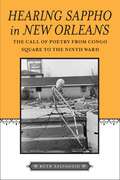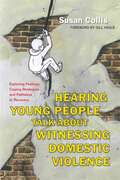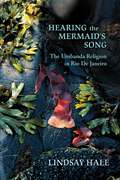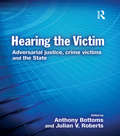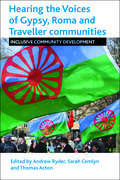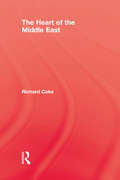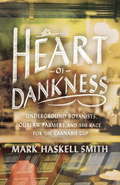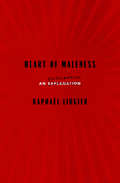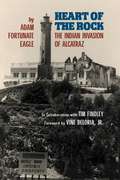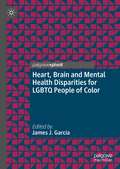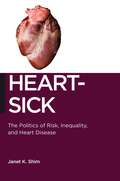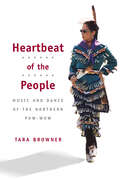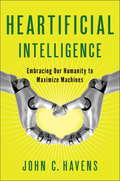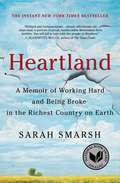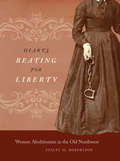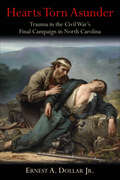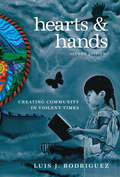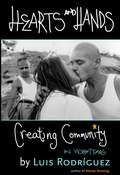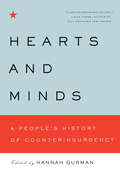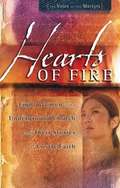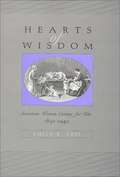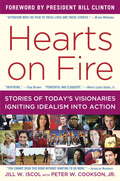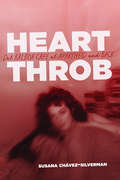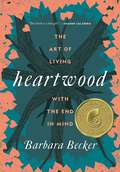- Table View
- List View
Hearing Sappho in New Orleans: The Call of Poetry from Congo Square to the Ninth Ward (Southern Literary Studies)
by Ruth SalvaggioWhile sifting through trash in her flooded New Orleans home, Ruth Salvaggio discovered an old volume of Sappho's poetry stained with muck and mold. In her efforts to restore the book, Salvaggio realized that the process reflected how Sappho's own words were unearthed from the refuse of the ancient world. Undertaking such a task in New Orleans, she sets out to recover the city's rich poetic heritage while searching through its flooded debris. Hearing Sappho in New Orleans is at once a meditation on this poetic city, its many languages and cultures, and a history of its forgotten poetry. Using Sappho's fragments as a guide, Salvaggio roams the streets and neighborhoods of the city as she explores the migrations of lyric poetry from ancient Greece through the African slave trade to indigenous America and ultimately to New Orleans.The book also directs us to the lyric call of poetry, the voice always in search of a listener. Writing in a post-Katrina landscape, Salvaggio recovers and ponders the social consequences of the "long song" -- lyric chants, especially the voices of women lost in time -- as it resonates from New Orleans's "poetic sites" like Congo Square, where Africans and Indians gathered in the early eighteenth century, to the modern-day Maple Leaf Bar, where poets still convene on Sunday afternoons. She recovers, for example, an all-but-forgotten young Creole woman named Lélé and leads us all the way up to celebrated contemporary writers such as former Louisiana poet laureate Brenda Marie Osbey, Sybil Kein, Nicole Cooley, and Katherine Soniat.Hearing Sappho in New Orleans is a reminder of poetry's ability to restore and secure fragile and fragmented connections in a vulnerable and imperiled world.
Hearing Young People Talk About Witnessing Domestic Violence: Exploring Feelings, Coping Strategies and Pathways to Recovery
by Gill Hague Susan CollisAt least 750,000 children a year worldwide witness domestic violence. These children grow up with an increased risk of developing symptoms associated with trauma and behavioural and mental health problems. This book explores the cases of five young people who have been victims of domestic violence. Allowing the young people to speak out in their own voices, it provides deep insight into how their experiences have affected their emotional behaviour, the complexities of issues related to it and those aspects of support which provide the greatest benefit to them. Drawing on her own personal experience of domestic violence as well as her professional expertise, the author emphasizes the importance of giving voice to victims of domestic violence and highlights the importance of acknowledging the emotional and spiritual lives of victims in order to provide holistic support and understanding, and it's potential to instigate healing. Hearing Young People Talk About Witnessing Domestic Violence is a vital resource for mental health professionals, social care workers, school counsellors and all professionals working in the field of domestic abuse.
Hearing Young People Talk About Witnessing Domestic Violence: Exploring Feelings, Coping Strategies and Pathways to Recovery
by Susan CollisAt least 750,000 children a year worldwide witness domestic violence. These children grow up with an increased risk of developing symptoms associated with trauma and behavioural and mental health problems.This book explores the cases of five young people who have been victims of domestic violence. Allowing the young people to speak out in their own voices, it provides deep insight into how their experiences have affected their emotional behaviour, the complexities of issues related to it and those aspects of support which provide the greatest benefit to them. Drawing on her own personal experience of domestic violence as well as her professional expertise, the author emphasizes the importance of giving voice to victims of domestic violence and highlights the importance of acknowledging the emotional and spiritual lives of victims in order to provide holistic support and understanding, and it's potential to instigate healing.Hearing Young People Talk About Witnessing Domestic Violence is a vital resource for mental health professionals, social care workers, school counsellors and all professionals working in the field of domestic abuse.
Hearing the Mermaid's Song: The Umbanda Religion in Rio de Janeiro
by Lindsay HaleThe Umbanda religion summons the spirits of old slaves and Brazilian Indians to speak through the mouths of mediums in trance. Its practitioners worship African gods, often calling them by the names of Catholic saints; simultaneously embrace the concepts of karma, reincarnation, and Christian charity; and believe in the capacities of both modern science and ancient magic. A relatively new religion dating to the beginning of the twentieth century, Umbanda has its origins in Rio de Janeiro and its surrounding urban areas where Afro-Brazilians, many ex-slaves or the descendants of slaves, practiced versions of the religion handed down to them by their ancestors. Umbanda's popularity has grown tremendously over the past century, attracting not only those who seek the assistance of spirits in solving problems in their lives, but those in pursuit of a path to a rich spiritual life and a fellowship of faith and service.Over the course of nearly a decade, Lindsay Hale spent countless hours attending rituals and festivals and interviewing participants of Umbanda, immersing himself in this fascinating religious world. In describing its many aspects and exploring its unique place within the lives of a wide variety of practitioners, Hale places Umbanda spiritual beliefs and practices within the broader context of Brazilian history and culture.
Hearing the Victim: Adversarial Justice, Crime Victims and the State (Cambridge Criminal Justice Series)
by Anthony Bottoms Julian RobertsIn recent years far more attention has been paid to victims of crime both in terms of awareness of the effect of crime upon their lives, and in changes that have been made to the criminal justice system to improve their rights and treatment. This process seems set to continue, with legislative plans announced to rebalance the criminal justice system in favour of the victim. This latest book in the Cambridge Criminal Justice Series brings together leading authorities in the field to review the role of the victim in the criminal justice system in the context of these developments.
Hearing the Voices of GRT Communities: Inclusive Community Development
by Andrew Ryder, Sarah Cemlyn and Thomas ActonOver the past decade, interest in Gypsies, Roma and Travellers (GRT) has risen up the political and media agendas, but they remain relatively unknown. This topical book is the first to chart the history and contemporary developments in GRT community activism, and the community and voluntary organisations and coalitions which support it. Underpinned by radical community development and equality theories, it describes the communities' struggle for rights against a backdrop of intense intersectional discrimination across Europe, and critiques the ambivalent role of community development in fostering these campaigns. Much of it co-written by community activists, it is a vehicle for otherwise marginalised voices, and an essential resource and inspiration for practitioners, lecturers, researchers and members of GRT communities.
Heart Of Middle East
by Richard CokeThe Heart of the Middle East is a classic account of the history and culture of Iraq. Written in 1925 at the height of the colonial era, it offers a unique insight into a complex past that continues to influence events today. Beginning with the earliest known inhabitants of what was called Mesopotamia, Coke describes Roman-Persian rivalry in the area, collaspe of both Persia and Constantinople before the onset of the Arabs, the golden age of Abbassid Caliphate, the coming of the Turks and, with their decline, the coming of the English, the rise in the Middle East of European influence generally and the parallel rise a reborn Arab nationalism.
Heart of Dankness
by Mark Haskell SmithReporting for the Los Angeles Times on the international blind tasting competition held annually in Amsterdam known as the Cannabis Cup, novelist Mark Haskell Smith sampled a variety of marijuana that was unlike anything he'd experienced. It wasn't anything like typical stoner weed, in fact it didn't get you stoned. This cannabis possessed an ephemeral quality known to aficionados as "dankness." Armed with a State of California Medical Marijuana recommendation, he begins a journey into the international underground where super-high-grade marijuana is developed and tracks down the rag-tag community of underground botanists, outlaw farmers, and renegade strain hunters who pursue excellence and diversity in marijuana, defying the law to find new flavors, tastes, and effects. This unrelenting pursuit of dankness climaxes at the Cannabis Cup, which Haskell Smith vividly portrays as the Super Bowl/Mardi Gras of the world's largest cash crop.From the Trade Paperback edition.
Heart of Maleness: An Exploration
by Raphaël LiogierIn this timely, self-reflective essay, a groundbreaking sociologist and philosopher examines the underlying causes of gender inequality and how we can fight against it.Following the shocking, infuriating accounts shared as part of the #MeToo movement, Raphaël Liogier felt compelled to apply his academic expertise to shed light on the roots of gender inequality and its many manifestations, including catcalling, workplace harassment, and rape, as well as the glass ceiling and the gender pay gap. In the brazenness of Donald Trump, who brags about groping women, in the hypocrisy of outspoken progressives whose private behavior belies their so-called feminist ideals, and even occasionally in the good intentions of men such as Liogier who strive to be allies, we can see the influence of a deep-seated fantasy of male dominance.With candor and clarity, Liogier demonstrates that the archetypal Prince Charming and a monstrous predator such as Harvey Weinstein are two sides of the same coin—products of a worldview that not only places a man's desires above a woman's, but also doubts whether women are fundamentally capable of knowing what they want. Recent years have witnessed significant progress toward gender equality, from the ousting of prominent men accused of sexual misconduct to the unprecedented popularity of the 2019 Women's World Cup. Heart of Maleness maps out the crucial work still to be done, first and foremost addressing the core male fantasy about women's bodies and minds.
Heart of the Rock: The Indian Invasion of Alcatraz
by Adam Fortunate Eagle Tim FindleyAn intimate memoir of the two-year invasion and occupation of Alcatraz by American Indians and of the events leading up to it. Traces and cultural agonies and federal pressures on American Indians "relocated" to urban areas that led to the invasion of Alcatraz.
Heart, Brain and Mental Health Disparities for LGBTQ People of Color
by James J. GarcíaThis timely edited collection presents a holistic and biopsychosocial analysis of LGBTQ People of Color well-being, focused on heart, brain, and mental health, and employs a unique incorporation of minority stress, intersectionality, and allostatic load frameworks.Bringing together established and emerging academics, its authors present a critical analysis of the latest research that encompasses the study of both risk and resilience factors in LGBTQ People of Color health. Across the book, they highlight the precise nature of the behavioral health disparities experienced by these communities, but further, they reveal the unique roles of intersectional discrimination and structural stigma as mechanisms for these disparities.With chapters also dedicated to federal policies and public health, this multidisciplinary work marks a seminal contribution that will pave the way for further advances in research, theory, and practice. It offers a valuable resource on an understudied population that will appeal to researchers, practitioners and policy makers in the fields of health psychology, public health, epidemiology, sociology, health sciences and medicine.
Heart-Sick: The Politics of Risk, Inequality, and Heart Disease (Biopolitics #15)
by Janet K. ShimHeart disease, the leading cause of death in the United States, affects people from all walks of life, yet who lives and who dies from heart disease still depends on race, class, and gender. While scientists and clinicians understand and treat heart disease more effectively than ever before, and industrialized countries have made substantial investments in research and treatment over the past six decades, patterns of inequality persist. In Heart-Sick, Janet K. Shim argues that official accounts of cardiovascular health inequalities are unconvincing and inadequate, and that clinical and public health interventions grounded in these accounts ignore many critical causes of those inequalities. Examining the routine activities of epidemiology—grant applications, data collection, representations of research findings, and post-publication discussions of the interpretations and implications of study results—Shim shows how social differences of race, social class, and gender are upheld by the scientific community. She argues that such sites of expert knowledge routinely, yet often invisibly, make claims about how biological and cultural differences matter—claims that differ substantially from the lived experiences of individuals who themselves suffer from health problems. Based on firsthand research at epidemiologic conferences, conversations with epidemiologists, and in-depth interviews with people of color who live with heart disease, Shim explores how both scientists and lay people define “difference” and its consequences for health. Ultimately, Heart-Sick explores the deep rifts regarding the meanings and consequences of social difference for heart disease, and the changes that would be required to generate more convincing accounts of the significance of inequality for health and well-being.
Heartbeat of the People: Music and Dance of the Northern Pow-wow (Music in American Life)
by Tara BrownerThe intertribal pow-wow is the most widespread venue for traditional Indian music and dance in North America. Heartbeat of the People is an insider's journey into the dances and music, the traditions and regalia, and the functions and significance of these vital cultural events. Tara Browner focuses on the Northern pow-wow of the northern Great Plains and Great Lakes to investigate the underlying tribal and regional frameworks that reinforce personal tribal affiliations. Interviews with dancers and her own participation in pow-wow events and community provide fascinating on-the-ground accounts and provide detail to a rare ethnomusicological analysis of Northern music and dance.
Heartificial Intelligence
by John HavensAs we program machines to be more like humans, how will they know what we value, if we don't know ourselves?The notion of robots gaining consciousness is beginning to become a reality, but the future of human happiness is dependent on our ability to teach machines what we value the most today. Featuring pragmatic solutions drawing on economics, emerging technologies, and positive psychology, Heartificial Intelligence provides a road map to help readers embrace the present and better define their future. Using fictional vignettes to help readers relate to larger concepts, this book paints a vivid portrait of how our lives might look in either a dystopia of robot dominance or a utopia where we use technology to enhance our natural abilities and evolve into a long-lived, super-intelligent, and caring species.ta that can be mined to reveal not just our buying habits and patterns, but how these patterns are impacted by our mood, the time of year, our location, and our interests?As Havens points out in H(app)inomics, the future needn't look so grim. Indeed, if we can wrest control of our personal data from corporations and use it to better understand ourselves, Havens argues, then we can combat this looming future and make love of life our most important personal economy.
Heartland: A Memoir of Working Hard and Being Broke in the Richest Country on Earth
by Sarah Smarsh*Finalist for the National Book Award* *Finalist for the Kirkus Prize* *Instant New York Times Bestseller* *Named a Best Book of the Year by NPR, New York Post, BuzzFeed, Shelf Awareness, Bustle, and Publishers Weekly* An essential read for our times: an eye-opening memoir of working-class poverty in America that will deepen our understanding of the ways in which class shapes our country and &“a deeply humane memoir that crackles with clarifying insight&”.*Sarah Smarsh was born a fifth generation Kansas wheat farmer on her paternal side, and the product of generations of teen mothers on her maternal side. Through her experiences growing up on a farm thirty miles west of Wichita, we are given a unique and essential look into the lives of poor and working class Americans living in the heartland. During Sarah&’s turbulent childhood in Kansas in the 1980s and 1990s, she enjoyed the freedom of a country childhood, but observed the painful challenges of the poverty around her; untreated medical conditions for lack of insurance or consistent care, unsafe job conditions, abusive relationships, and limited resources and information that would provide for the upward mobility that is the American Dream. By telling the story of her life and the lives of the people she loves with clarity and precision but without judgement, Smarsh challenges us to look more closely at the class divide in our country. Beautifully written, in a distinctive voice, Heartland combines personal narrative with powerful analysis and cultural commentary, challenging the myths about people thought to be less because they earn less. &“Heartland is one of a growing number of important works—including Matthew Desmond&’s Evicted and Amy Goldstein&’s Janesville—that together merit their own section in nonfiction aisles across the country: America&’s postindustrial decline...Smarsh shows how the false promise of the &‘American dream&’ was used to subjugate the poor. It&’s a powerful mantra&” *(The New York Times Book Review).
Hearts Beating For Liberty
by Stacey M. RobertsonChallenging traditional histories of abolition, this book shifts the focus away from the East to show how the women of Ohio, Indiana, Illinois, Michigan, and Wisconsin helped build a vibrant antislavery movement in the Old Northwest. Stacey Robertson argues that the environment of the Old Northwest--with its own complicated history of slavery and racism--created a uniquely collaborative and flexible approach to abolitionism. Western women helped build this local focus through their unusual and occasionally transgressive activities. They plunged into Liberty Party politics, vociferously supported a Quaker-led boycott of slave goods, and tirelessly aided fugitives and free blacks in their communities. Western women worked closely with male abolitionists, belying the notion of separate spheres that characterized abolitionism in the East. The contested history of race relations in the West also affected the development of abolitionism in the region, necessitating a pragmatic bent in their activities. Female antislavery societies focused on eliminating racist laws, aiding fugitive slaves, and building and sustaining schools for blacks. This approach required that abolitionists of all stripes work together, and women proved especially adept at such cooperation.
Hearts Torn Asunder: Trauma in the Civil War’s Final Campaign in North Carolina
by Ernest A. Dollar&“This study goes beyond the military aspects to examine the psychological and emotional impacts on the participants, both military and civilian.&” —Charles R. Knight, author of From Arlington to Appomattox One day after General Robert E. Lee&’s surrender on April 9, 1865, more than 120,000 Union and Confederate soldiers were still in the field bringing war with them as they moved across North Carolina&’s verdant heartland. Thousands of paroled Rebels, desperate, distraught, and destitute, added to the chaos by streaming into the state from Virginia. Grief-stricken civilians, struggling to survive in a collapsing world, were caught in the middle. The collision of these groups formed a perfect storm long ignored by those wielding pens. Hearts Torn Asunder explores the psychological experience of these soldiers and civilians during the chaotic closing weeks of the war. Their letters, diaries, and accounts reveal just how deeply the killing, suffering, and loss had hurt and impacted these people by the spring of 1865. Dollar deftly recounts the experiences of men, women, and children who endured intense emotional, physical, and moral stress during the war&’s dramatic climax. Their emotional, irrational, and often uncontrollable reactions mirror symptoms associated with trauma victims today, all of which combined to shape memory of the war&’s end. Once the armies left North Carolina after the surrender, their stories faded with each passing year. Neither side looked back and believed there was much that was honorable to celebrate. Hearts Torn Asunder recounts at a very personal level what happened during those closing days that made a memory so painful that few wanted to celebrate, but none could forget.
Hearts and Hands, Second Edition
by Luis J. RodriguezHearts and Hands focuses on healing through community building. Empowered by thirty years of experience with gangs in Los Angeles and Chicago, Rodri guez offers a unique book of change. He makes concrete suggestions, shows how we can create nonviolent opportunities for youth today, and redirects kids into productive and satisfying lives. And he warns that we sacrifice community values for material gain when we incarcerate or marginalize people already on the edge of society. His drive to dissolve gang influence on kids is as personal as it is societal; his son, to whom he dedicates Hearts and Hands, served more than a decade in prison for gang-related activity. With anecdotes, interviews, and time-tested guidelines, Hearts and Hands makes a powerful argument for building and supporting community life. From the Trade Paperback edition.
Hearts and Hands: Creating Community in Violent Times
by Luis RodriguezHearts and Hands deals with many of the difficult issues addressed in Luis Rodríguez's memoir of gang life, Always Running, but with a focus on healing through community building. Empowered by his experiences as a peacemaker with gangs in Los Angeles and Chicago, Rodríguez offers a unique book of change. He makes concrete suggestions, shows how we can create nonviolent opportunities for youth today, and redirects kids into productive and satisfying lives. And he warns that we sacrifice community values for material gain when we incarcerate or marginalize people already on the edge of society. His interest in dissolving gang influence on black and latino kids is personal as well as societal; his son, to whom he dedicates Hearts and Hands, is currently serving a prison sentence for gang-related activity. With anecdotes, interviews, and time-tested guidelines, Hearts and Hands makes a powerful argument for building and supporting community life.
Hearts and Minds
by Hannah GurmanThe first book of its kind, Hearts and Minds is a scathing response to the grand narrative of U.S. counterinsurgency, in which warfare is defined not by military might alone but by winning the "hearts and minds" of civilians. Dormant as a tactic since the days of the Vietnam War, in 2006 the U.S. Army drafted a new field manual heralding the resurrection of counterinsurgency as a primary military engagement strategy; counterinsurgency campaigns followed in Iraq and Afghanistan, despite the fact that counterinsurgency had utterly failed to account for the actual lived experiences of the people whose hearts and minds America had sought to win.Drawing on leading thinkers in the field and using key examples from Malaya, the Philippines, Vietnam, El Salvador, Iraq, and Afghanistan, Hearts and Minds brings a long-overdue focus on the many civilians caught up in these conflicts. Both urgent and timely, this important book challenges the idea of a neat divide between insurgents and the populations from which they emerge--and should be required reading for anyone engaged in the most important contemporary debates over U.S. military policy.
Hearts of Fire
by The Voice of the MartyrsStories of persecuted Christian women compiled by the Voice of the Martyrs.
Hearts of Wisdom: American Women Caring for Kin, 1850-1940
by Emily K. AbelDrawing upon a wealth of diaries, letters, and case records from hospitals and social service agencies, the author examines the shifting roles of caregivers between 1850 and 1940. In addition to the diaries and letters of literate white woman, she turns to slave narratives from the antebellum south and records from health-care agencies serving American Indians during the first part of the 20th century. Abel shows that women in the 19th century gained self-esteem and status through their knowledge of home remedies and nursing techniques. The medical profession gained strength with the discovery of microbes and the development of medications to treat specific diseases. During the 20th century professionals discredited women who provided health care at home. One chapter discusses mothers of children with epilepsy or mental retardation, who were pressured to place their children in institutions and to sever emotional ties with them. Another chapter explores the shift from American sign language to oralism in the education of deaf children, and the impact this had upon mothers. Abel concludes by looking briefly at the current trend to return more and more caregiving to the home.
Hearts on Fire: Stories of Today's Visionaries Igniting Idealism into Action
by Bill Clinton Peter W. Cookson Jill IscolINSPIRING STORIES OF FOURTEEN VISIONARIES WHO MADE A DIFFERENCE IN THE WORLD--AND A BOLD CALL TO ACTION TO MOTIVATE THE NEXT GENERATION OF LEADERS There's Amy Lehman, a gutsy single mother who is building a floating health clinic on Lake Tanganyika; Jimmie Briggs, a journalist campaigning to stop violence against girls and women; and Jacob Lief, a young American who founded a school for street children in South Africa. You will discover how Josh Nesbit, Isaac Holeman, and Nadim Mahmud are connecting rural patients to hospitals using cellphone technology, how Susana De Anda is bringing fresh water to the migrant workers in California's San Joaquin Valley, and how Andeisha Farid is establishing, in the face of war, orphanages for Afghanistan's child victims of war and poverty. These are just some of the stories that will inspire you. Visionaries don't wait for others to take action. They step out. They are brave. They walk the walk. And they connect with others in deep and real ways. Jill Iscol's message is that everyone has the talent and compassion to make the world a better place. Hearts on Fire is a call to action for all of us.Praise for Hearts on Fire "Attention must be paid to these lives and these stories. In Jill Iscol's capable hands, their stories offer us hope--just when we need it."--Brian Williams, NBC News "What inspiring stories of people who have made meaningful lives through service and sacrifice--one person at a time. These are our world leaders!"--Richard Gere "Hearts on Fire is one of the most inspiring books I've read."--Tina Brown, editor-in-chief, The Daily Beast and Newsweek "Clear and compelling . . . I know you will be inspired by the visionaries in Hearts on Fire."--President Bill Clinton "A powerful call to action for each of us to marry passion with purpose and act boldly in the quest for a more just and sustainable world."--Cheryl Dorsey, president of Echoing Green "Powerful and eloquent, Hearts on Fire is a passionate and infectious invitation to get involved and help make the world a better place."--Henry Louis Gates Jr., Alphonse Fletcher University Professor at Harvard University "A beautifully appointed treasure box filled with inspiration and possibility. You cannot read this book without wanting to do more."--Jacqueline Novogratz, founder and CEO of Acumen Fund "A desperately needed antidote for those discouraged by the dysfunctional politics that have left so many on our planet vulnerable and voiceless."--Billy Shore, founder and executive director of Share Our Strength "Hearts on Fire reminds us that we need to dream again, inspire again, and act again."--Wes Moore, New York Times bestselling author of The Other Wes Moore "Vivid, down-to-earth, and well-told, Hearts on Fire will comfort and inspire anybody trying to do a little bit to make this world a more connected and compassionate place."--Ethan Nichtern, founder of The InterDependence Project, and author of One City: A Declaration of Interdependence
Heartthrob: Del Balboa Cafe al Apartheid and Back
by Susana Chávez-SilvermanHeartthrob: Del Balboa Cafe al Apartheid and Back
Heartwood: The Art of Living with the End in Mind
by Barbara Becker“We can do extraordinary things when we lead with love,” Barbara Becker reminds us in her debut memoir Heartwood.When her earliest childhood friend is diagnosed with a terminal illness, Becker sets off on a quest to immerse herself in what it means to be mortal. Can we live our lives more fully knowing some day we will die?With a keen eye towards that which makes life worth living, interfaith minister, mom and perpetual seeker Barbara Becker recounts stories where life and death intersect in unexpected ways. She volunteers on a hospice floor, becomes an eager student of the many ways people find meaning at the end of life, and accompanies her parents in their final days. Becker inspires readers to live with the end in mind and proves that turning toward loss rather than away from it is the only true way to live life to its fullest. Just as with the heartwood of a tree—the central core that is no longer alive yet supports the newer growth rings—the dead become an enduring source of strength to the living.With life-affirming prose, Becker helps us see that that grief is not a problem to be solved, but rather a sacred invitation—an opportunity to let go into something even greater…a love that will inform all the days of our lives.
